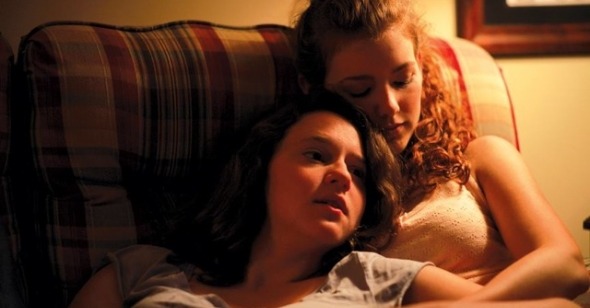Bigger Love
by Michael Koresky
The Wise Kids
Dir. Stephen Cone, U.S., Wolfe
Sexuality and spirituality make for oddly natural bedfellows in Stephen Cone’s gentle, authentic The Wise Kids. Equally generous to all of its characters in a way that seems borderline radical for an American indie, this is a becalmed work about roiling emotions. Perhaps we’ve seen other films that follow the tumultuous transitional years of teenagers, preparing to leave their provincial towns behind and shuttle off to college, but Cone is particularly observant, and his narrative is remarkable in its specificity: these three young people, at once fragile and resilient, hail from a Southern Baptist community in Charleston, South Carolina. Their desires are therefore pitted against long-instilled beliefs, and their community is as much a part of their identity as their private lives. The Wise Kids isn’t a strident portrait of breaking free from this world, however; rather Cone patiently watches as his characters struggle to figure out for themselves what’s best.
Alongside burgeoning freethinker Brea (Molly Kunz), emerging-from-the-closet Tim (Tyler Ross), and staunch believer Laura (Allison Torem), a small suburban slice of Charleston itself is the fourth main character. Yet though the writer-director hails from Charleston, and is the son of a Baptist preacher, he doesn’t overemphasize environment the way other self-consciously “regional” filmmakers might, allowing it to simply become part of the emotional landscape. The film’s pacing and tone are set by the vibrations of the actors’ organic interactions; through his patient naturalism, Cone achieves a balance of finely wrought character study and observant sociology.
This Charleston isn’t one populated with self-righteousness, or even faux gentility. Instead, Cone allows for a sociable, rural comfort that’s in play even when its characters are most inwardly tortured. Confrontations are on the way: preacher’s daughter Brea is beginning to question the beliefs of her congregation, Googling “Bible contradictions,” flubbing the words to hymns, and seeking the friendship of a local lapsed Christian woman (Sadie Rogers); Tim is growing to accept his homosexuality with a grace that indicates he’s clearly on a path to emotional healthiness, yet he still needs the approbation of family and friends; and Laura, firmly entrenched in her piety, is feeling left behind while her two best friends are busy groping their way to independence.
Laura’s teary-eyed response to discovering Tim’s slow coming-out, already in progress at movie’s opening, is particularly well delivered by Torem (“You can’t be both . . . that’s, like, a paradox”); what’s most refreshing about Laura is that neither actress nor writer-director delights in her plight, though she’s ostensibly playing the role of the “unenlightened” one. The fresh-as-buttercream Kunz and the Gumby-limbed Ross offer convincing, sensitively shaded teens, but it’s Torem who seems to have crafted her character from the inside-out, speeding up and slowing down her speech patterns at unexpected moments and using an arsenal of awkward gestures and mannerisms indicating that she’s as uncomfortable in her own skin as the more ready-to-admit-it Brea and Tim. If the long path to individuality taken by those two is what we aspire to, the settling typified by Laura is what we fear, and often what we are, making Laura, for all her stubbornness, in many ways the most relatable character. A later awkward first meeting with her future college roommate is one of the film’s most vivid moments, laying bare Laura’s insecurities and repositioning her theological confidence as the defense mechanisms of a scared child.
The Wise Kids isn’t focused exclusively on coming-of-age tales: set up as counterpoint to the teenagers’ struggles are those of loyal church members Elizabeth and Austin (Sadieh Rifai and Cone himself, both of whom gently convey loneliness and comfortable companionship), a married couple who help out at the church. Approximately a decade older than the protagonists, they are dealing with their own emotional crises, as his evident homosexuality (manifesting as a crush on young Tim) is leaving her more than a touch sexually undernourished (causing her eyes wander to the cute stranger applying for the new youth minister position). Austin’s direction of the church’s upcoming passion play provides the film with a structural through-line (as well as the requisite eroticized Jesus), but his presence also unites the film’s two threads, putting into perspective the kids’ paroxysms of faith by implying that self-actualization might not be quite so simple ten years later. It’s clear that Austin’s not only craving sensual intimacy with a man, but that he feels he’s missed out on his youth, expressed in his attraction to Tim, as well as in more subtle ways, such as his insistence at one point that his wife tell him that he looks “cute” as they prepare to go out. (It might not be too late for Austin, but it probably is for Harry, the effeminate middle-aged church organist, as Cone seems to imply in the richly poignant closing scene.)
Cone’s compassion is infectious. Difficult emotions close the film, with open-ended sendoffs for some of the characters, but one feels that they’re in good hands nonetheless—their creator’s, their filmmaker’s. The good nature of The Wise Kids—achieved tonally in no small part to Stephanie Dufford’s warm-toned cinematography and Mikhail Fiksel’s reserved score—envelops everyone on-screen. Near the beginning and end of the film, a main character is shown looking up: it’s as good a direction as any to seek answers, whether it’s to the skies or to another human being. This isn’t simply a portrait of vulnerable people, but a film that’s intensely vulnerable itself. You want to give it a hug before it dissolves into pieces.
